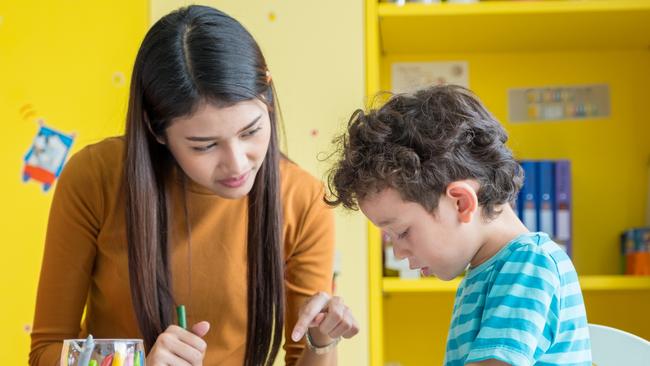How to prepare your children for school
Sometimes conversations about school can unintentionally amplify children’s feelings of nerves. These tips will help you prepare you child in the right way, writes psychologist Judith Locke.

Rendezview
Don't miss out on the headlines from Rendezview. Followed categories will be added to My News.
So, Christmas and New Year are over and I’m sure many parents’ thoughts are turning to the next event – their child starting school and entering prep or pre-prep.
Are they excited? Are they nervous? More importantly, how are you feeling?
Many parents want to check in with their child about their thoughts about starting school, and that a good idea. But you want to make sure that conversation is going to make them feel better about school and not worse.
When faced with their child’s nerves and hesitation, parents can inadvertently make their child worry more. That because sometimes lengthy conversations about fear can unintentionally amplify the child’s feelings. Also, children are very good at picking up their parents’ mood, so if their parent is concerned about their child’s apprehension and they show it too much, then the child is going to worry even more.
MORE FROM JUDITH LOCKE: What value is childhood without thrills and spills?
So, what is a better way to have a conversation about starting school?
Check in with your child a few times over the weeks leading up to school with a low-key question or two. ‘School starts in three weeks – how are you feeling?’ ‘Do you think you are ready with everything? Are you excited?’

If your child answers positively – then no problem. But, if they say they are nervous or worried, then do the following.
• Listen to their concerns, summarise, and then check your understanding, ‘Sounds like you are a little apprehensive that you might have some difficulty making friends. Is that right?’
• If they agree, then empathise, but also normalise, ‘That sounds tricky, but you know, a lot of kids worry about that on the first day. Even some adults worry a bit about starting a new job or going to a party.’
• You might then reassure them, ‘It is pretty rare you make a best friend on the first day, but over time you will get to know the kids in your year very well.’
MORE FROM JUDITH LOCKE: How to make the after school pick up enjoyable
• Try not to be too definitive in your reassurances. Saying, ‘Oh don’t worry you’ll make heaps of friends the very first day you go’ reassures them in a manner that is likely to be false. It will build their expectations and make it more likely that they will feel let down if your predictions don’t come true.
• Encourage them with a you will cope mentality. Remind them of the times they have done difficult things but been brave, the times they have worried, but it all worked out OK, the times where they did make a mistake, but it was all sorted out in the end.
Important in all of this is to watch your own worry and expectations. Don’t let your own fears about your child’ first few weeks or first year overwhelm you. Odds are they will cope with it all and thrive at school. Even if there are issues, it is highly likely that they will be resolved with time or a few new strategies.

Reducing your expectations might help here. It is highly unlikely that they will form close friendships in their first few months of school, particularly in the younger years, and, while they may have a few children they play with, it is very rare they would be able to name someone as their best friend early in their schooling. Even if your child is slow at making friends, don’t start worrying unnecessarily; some kids just take a little longer to work out the social mores.
Finally, there is no point worrying about an event that hasn’t taken place yet. Relax and be confident that you and your child will cope with whatever comes along.
MORE FROM JUDITH LOCKE: How to convince your child that you’re in charge
Don’t amp up the first day of school too much, as it risks your child becoming overwhelmed.
● Be careful of too many people turning up with your child on the first day of school. You have to be careful you don’t put more pressure on your child with endless photo opportunities and hordes of wellwishers, particularly if your child has a tendency to become easily overexcited.
● To avoid this, maybe get family and friends together the day before school starts for a morning or afternoon tea, where your child can show themselves dressed in their uniform and display their new school bag and lunch box.
● This also might help you do a trial run of getting them ready.
● Then, just have one or both parents show up with a child for their first day.
Originally published as How to prepare your children for school
